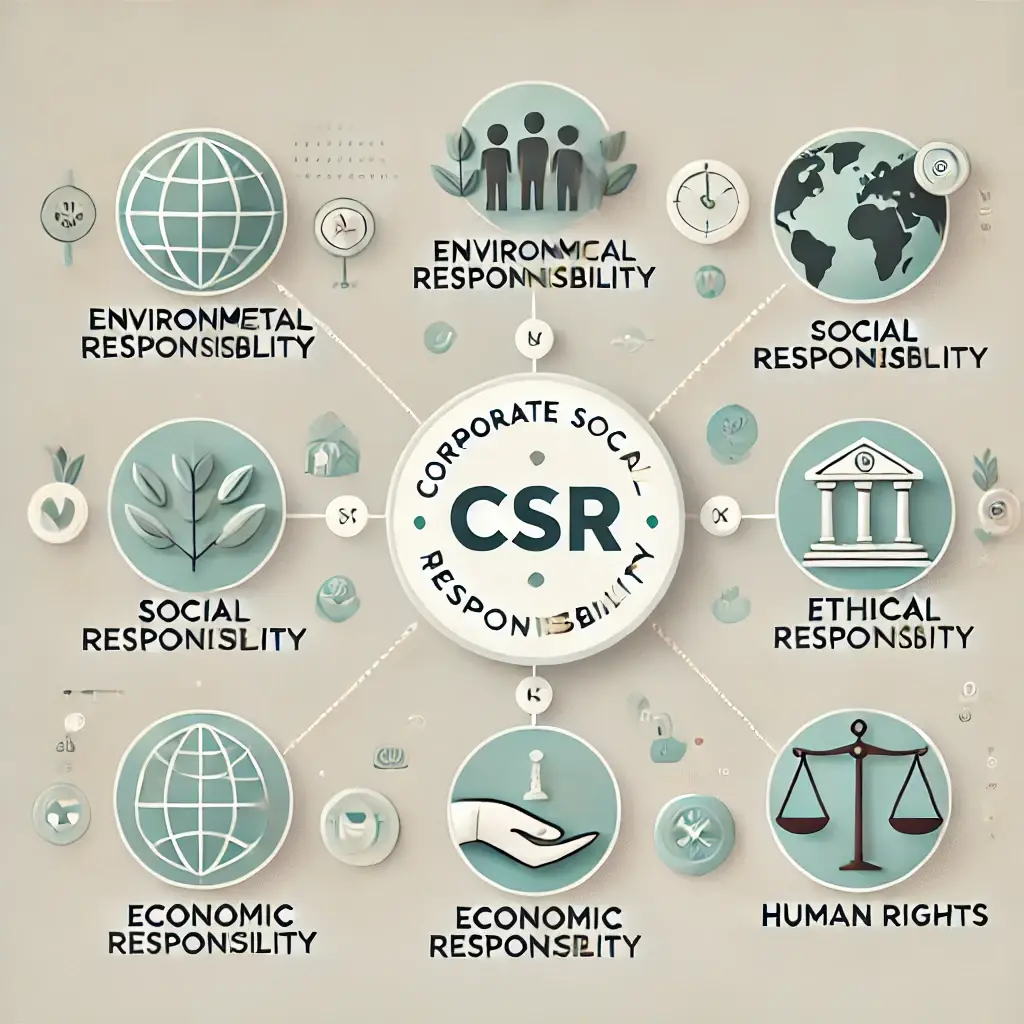Corporate Social Responsibility (CSR) refers to the practices and policies that businesses implement to operate in ways that are ethical, socially responsible, and beneficial to society. CSR goes beyond profitability and compliance with regulations; it involves making a positive impact on society, the environment, and the economy. Companies that adopt CSR practices demonstrate their commitment to various stakeholders, including employees, customers, shareholders, communities, and the environment.
Key Aspects of Corporate Social Responsibility
- Environmental Responsibility
- Focuses on reducing the ecological footprint of a company by promoting sustainable practices.
- Examples: Reducing waste, minimizing carbon emissions, using renewable energy, and supporting reforestation projects.
- Social Responsibility
- Involves giving back to society and supporting community development.
- Examples: Community engagement, charitable donations, volunteer programs, and improving access to education and healthcare.
- Ethical Responsibility
- Emphasizes ethical business practices and adherence to high standards of integrity.
- Examples: Fair trade practices, anti-corruption measures, ensuring diversity and inclusion, and providing fair wages and safe working conditions.
- Economic Responsibility
- Aims to contribute positively to the economic well-being of society.
- Examples: Supporting local suppliers, investing in local communities, paying fair taxes, and creating job opportunities.
- Human Rights
- Ensures that all business operations respect human rights.
- Examples: Preventing child labor, promoting fair labor practices, and protecting worker rights.
Importance of Corporate Social Responsibility
CSR is crucial because it allows companies to make a positive contribution to society while also building trust with consumers and other stakeholders. Here are some reasons CSR is essential:
- Enhanced Brand Image and Reputation: Companies known for strong CSR commitments often enjoy a better public image, increasing customer loyalty.
- Employee Satisfaction and Retention: CSR initiatives can boost employee morale and attract top talent who value working for socially responsible companies.
- Risk Mitigation: By proactively addressing ethical and environmental concerns, companies can mitigate reputational risks and comply with regulations more effectively.
- Competitive Advantage: CSR can differentiate a company in the marketplace, especially as consumers increasingly support businesses with responsible practices.
Examples of Corporate Social Responsibility Initiatives
- Green Initiatives: Many companies adopt environmentally-friendly policies, such as reducing plastic use, improving energy efficiency, and sourcing sustainable materials.
- Social Impact Programs: Organizations might sponsor educational programs, support healthcare initiatives, or work on improving access to clean water in underdeveloped regions.
- Diversity and Inclusion Programs: Companies may implement policies and programs to foster a diverse and inclusive workplace.
- Employee Volunteering: Some companies encourage employees to participate in community service, offering paid time off for volunteering.
- Ethical Sourcing: Many companies ensure that their supply chains comply with fair labor standards, benefiting both suppliers and consumers.
CSR Reporting and Standards
CSR activities are often reported in sustainability or CSR reports, which outline the company’s initiatives, goals, and achievements. Many organizations follow established frameworks and standards, such as:
- Global Reporting Initiative (GRI): A global standard for reporting CSR and sustainability practices.
- ISO 26000: Provides guidance on social responsibility.
- UN Sustainable Development Goals (SDGs): Many companies align their CSR initiatives with the United Nations SDGs to address global challenges such as poverty, inequality, and climate change.
Conclusion
Corporate Social Responsibility is increasingly viewed as essential for business success. It reflects a company’s commitment to making a positive social, environmental, and economic impact, going beyond profit to create a sustainable future. By integrating CSR into their core strategies, companies not only fulfill their ethical duties but also strengthen their brand, enhance customer loyalty, and contribute to a better world.

